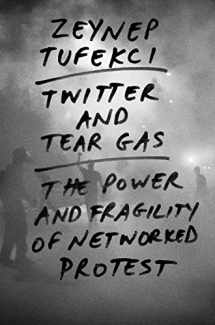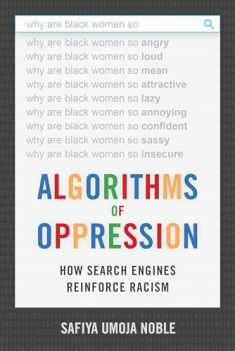
Twitter and Tear Gas: The Power and Fragility of Networked Protest
ISBN-13:
9780300215120
ISBN-10:
0300215126
Author:
Zeynep Tufekci
Publication date:
2017
Publisher:
Yale University Press
Format:
Hardcover
360 pages
FREE US shipping
Book details
ISBN-13:
9780300215120
ISBN-10:
0300215126
Author:
Zeynep Tufekci
Publication date:
2017
Publisher:
Yale University Press
Format:
Hardcover
360 pages
Summary
Twitter and Tear Gas: The Power and Fragility of Networked Protest (ISBN-13: 9780300215120 and ISBN-10: 0300215126), written by authors
Zeynep Tufekci, was published by Yale University Press in 2017.
With an overall rating of 3.7 stars, it's a notable title among other
Social Media
(Internet & Social Media, Communication & Media Studies, Social Sciences) books. You can easily purchase or rent Twitter and Tear Gas: The Power and Fragility of Networked Protest (Hardcover) from BooksRun,
along with many other new and used
Social Media
books
and textbooks.
And, if you're looking to sell your copy, our current buyback offer is $0.31.
Description
A firsthand account and incisive analysis of modern protest, revealing internet-fueled social movements’ greatest strengths and frequent challenges
To understand a thwarted Turkish coup, an anti–Wall Street encampment, and a packed Tahrir Square, we must first comprehend the power and the weaknesses of using new technologies to mobilize large numbers of people. An incisive observer, writer, and participant in today’s social movements, Zeynep Tufekci explains in this accessible and compelling book the nuanced trajectories of modern protests—how they form, how they operate differently from past protests, and why they have difficulty persisting in their long-term quests for change.
Tufekci speaks from direct experience, combining on-the-ground interviews with insightful analysis. She describes how the internet helped the Zapatista uprisings in Mexico, the necessity of remote Twitter users to organize medical supplies during Arab Spring, the refusal to use bullhorns in the Occupy Movement that started in New York, and the empowering effect of tear gas in Istanbul’s Gezi Park. These details from life inside social movements complete a moving investigation of authority, technology, and culture—and offer essential insights into the future of governance.
To understand a thwarted Turkish coup, an anti–Wall Street encampment, and a packed Tahrir Square, we must first comprehend the power and the weaknesses of using new technologies to mobilize large numbers of people. An incisive observer, writer, and participant in today’s social movements, Zeynep Tufekci explains in this accessible and compelling book the nuanced trajectories of modern protests—how they form, how they operate differently from past protests, and why they have difficulty persisting in their long-term quests for change.
Tufekci speaks from direct experience, combining on-the-ground interviews with insightful analysis. She describes how the internet helped the Zapatista uprisings in Mexico, the necessity of remote Twitter users to organize medical supplies during Arab Spring, the refusal to use bullhorns in the Occupy Movement that started in New York, and the empowering effect of tear gas in Istanbul’s Gezi Park. These details from life inside social movements complete a moving investigation of authority, technology, and culture—and offer essential insights into the future of governance.


We would LOVE it if you could help us and other readers by reviewing the book
Book review

Congratulations! We have received your book review.
{user}
{createdAt}
by {truncated_author}




